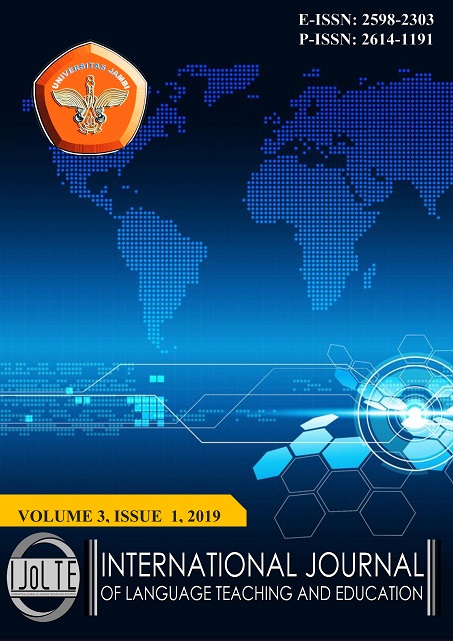Optimality Theory in ESL Phonology: A Practice of Final Consonant Clusters from Vietnamese L1 Speakers
DOI:
https://doi.org/10.22437/ijolte.v3i1.6178Keywords:
constraints, final consonant cluster, optimality theory, strategies, vietnamese ESL learnersAbstract
The present study aims to adopt the Optimality Theory to investigate the strategies of pronouncing the final consonant clusters in English by a group of Vietnamese L1 speakers. Vietnamese is a language without the final consonant clusters; therefore, Vietnamese ESL learners tend to have different strategies to pronounce those. Seven Vietnamese graduate students were employed to record their word-list out-loud reading. Each of the consonants occurring in their pronunciation production was considered as one token to be analyzed. The result shows that Vietnamese ESL learners employ five different strategies to generate the final consonant clusters. After that, by adopting the Optimality Theory, this study provides both faithfulness constraints and markedness constraints for each strategy with the attempt to generalize the cases of the final consonant pronunciation of Vietnamese speakers. This study is significant for ESL teachers to understand how the Vietnamese language affects the ESL learners’ final sound pronunciation
Downloads
Downloads
Published
Versions
- 2019-07-24 (1)
- 2019-07-24 (1)
How to Cite
Issue
Section
License
The Authors submitting a manuscript do so on the understanding that if accepted for publication, copyright of the article shall be assigned to International Journal of Language Teaching and Education (IJoLTe) and Magister Program of English Education Department, Universitas Jambi as publisher of the journal. Copyright encompasses rights to reproduce and deliver the article in all form and media, including reprints, photographs, microfilms, and any other similar reproductions, as well as translations.
IJoLTe keep the rights to articles that have been published. And, the authors are permitted to disseminate published article by sharing the link of IJoLTe' website. Authors are allowed to use their works for any purposes deemed necessary without written permission from IJoLTe with an acknowledgement of initial publication in this journal.
IJoLTe and Magister Program of English Education Department, Universitas Jambi, and the Editors make every effort to ensure that no wrong or misleading data, opinions or statements be published in the journal. In any way, the contents of the articles and advertisements published in IJoLTe are the sole and responsibility of their respective authors and advertisers.
If the article was jointly prepared by more than one author, any authors who submitting the manuscript warrants that he/she has been authorized by all co-authors to be agreed on this copyright and license notice (agreement) on their behalf, and agrees to inform his/her co-authors of the terms of this policy. IJoLTe will not be held liable for anything that may arise due to the author(s) internal dispute. IJoLTe will only communicate with the corresponding author.
By submitting the article/manuscript to this journal, the authors agree with this policy and consciously agree that IJoLTe does not provide royalties or other fees to the authors for their published articles. By agreeing this policy, IJoLTe ensures that published articles are publicly accessible and will be free of charge for the readers. No specific document sign-off is required.
Users of this website will be licensed to use materials from this website following the Creative Commons Attribution 4.0 International License. Please use the materials accordingly
You are free to:
- Share — copy and redistribute the material in any medium or format
- Adapt — remix, transform, and build upon the material for any purpose, even commercially.
- The licensor cannot revoke these freedoms as long as you follow the license terms.








1.png)
